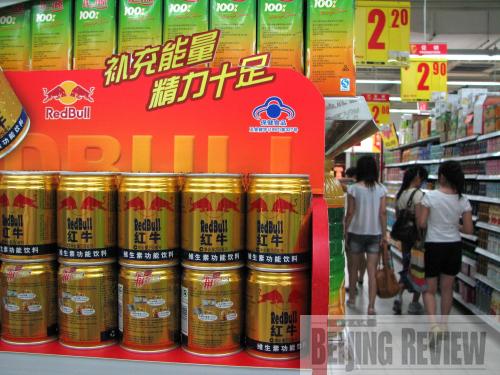|
 |
|
CHALLENGING THE LAW: Red Bull products are displayed at a supermarket in Jinan, Shandong Province. Red Bull drinks are still on sale in China though they have been recalled in many other countries (CNSPHOTO) |
"Drink Red Bull when you feel sleepy or tired" is a famous advertising slogan well-known to Chinese. But a recent German study that found trace amounts of cocaine in Red Bull Cola has consumers feeling jittery.
In late May a health institute in Germany published a study that found 0.13 mg of cocaine per can of Red Bull Cola. Six German states banned sales of the drink in response. A few days later, officials in China's Taiwan confiscated 18,000 cases of Red Bull imported from Austria and ordered the product to be removed from shelves over similar concerns. Red Bull remains on the shelves on the mainland.
Cocaine is a powerful central nervous system stimulant that comes from the leaves of the coca plant. Seventy mg of pure cocaine can kill a person weighing 70 kg immediately.
The Red Bull producer in China claimed that all its products are made and sold on the Chinese mainland, all Red Bull drinks comply with related provisions of the Food Safety Law, and imported Red Bull drinks containing cocaine are not sold on the mainland. On June 4, China's General Administration of Quality Supervision, Inspection and Quarantine announced that it had arranged for the quality and technical supervision bureaus in Beijing, Hubei and Hainan to carry out special inspections of Red Bull drinks made by the three Red Bull producers in China--Red Bull Vitamin Drink Co. Ltd., Red Bull Vitamin Drink (Hubei) Co. Ltd. and Hainan Red Bull Beverage Co. Ltd.---and that none of the products were found to contain cocaine.
But Chinese consumers are still wary: Are the formulas for Red Bull drinks produced and sold on the Chinese mainland the same as those for imported Red Bull drinks? According to convention, the formulas for products of the same brand should be more or less the same. Production is just processing, while the formula determines which ingredients are used. Furthermore, Germany and China's Taiwan detected cocaine in Red Bull products only recently. Did previous products not have this problem, or was the problem only just now discovered?
Origins of Red Bull
Red Bull is an energy drink inspired by a Thai product in the 1970s that was popular among night-shift workers, long-haul truckers and Thai boxers. In 1982, an Austrian businessman named Dietrich Mateschitz purchased its formula and trademark, selling it to markets outside Asia.
Mateschitz established Red Bull GmbH in Austria in 1984. The headquarters and factory are in Fuschl am See, a small Austrian city, where Mateschitz improved the formula by adding carbonates. Red Bull became a popular carbonated beverage among young people in Austria. In 1992 the improved Red Bull drinks were sold to countries outside Austria for the first time, and over the next few years the market expanded to more than 100 countries and regions.
In December 1995, Red Bull entered China, and Red Bull Vitamin Drink Co. Ltd. was established to develop the Chinese market. In 1998, Red Bull China moved its headquarters from Shenzhen, Guangdong Province, to Beijing and became one of the largest foreign-invested companies in the capital. Red Bull China has set up more than 30 branches or representative offices and 80 offices throughout the country. In December 2001, Red Bull China was recognized by the Chinese Government as one of the top 10 foreign-invested companies in the food industry from 1981 to 2001.
| 